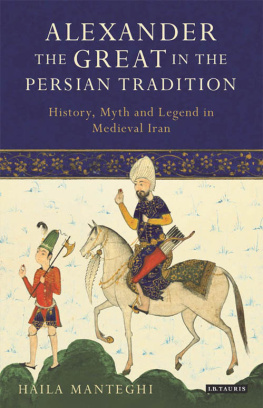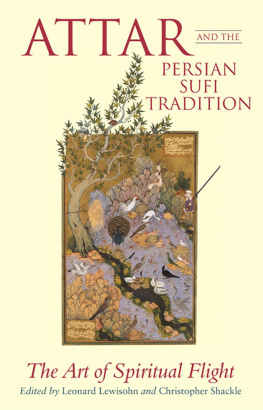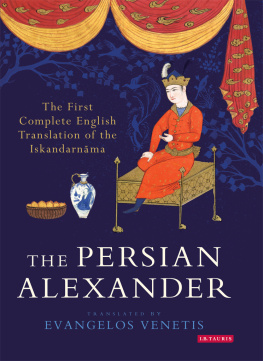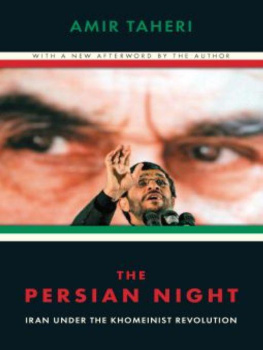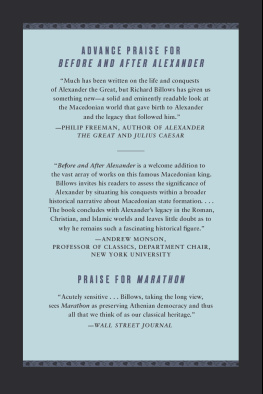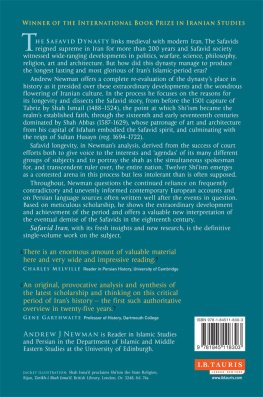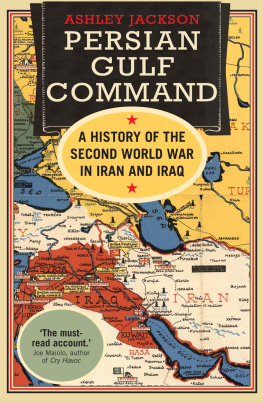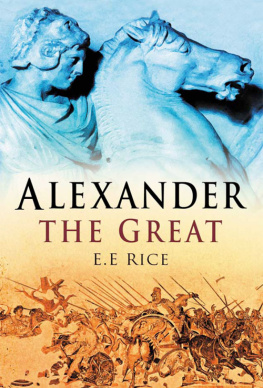
Haila Manteghi is a lecturer at the University of Mnster and recently completed her second PhD, on the Persian Alexandrian tradition, at the University of Exeter. Her first PhD, on the Shhnma of Firdaws, was completed at the University of Alicante, and she has published in peer-reviewed journals and edited collections.
Though Alexanders conquest of Persia and assumption of the Persian throne is a historical fact, the transmission of his legendary story from the Greek original, via the fifth-century CE Syriac translation, to Persian literature has until now eluded explanation. Haila Manteghis masterly exploration of the question shows for the first time what had been suspected but never demonstrated, that Pahlavi oral tradition played an important part in the centuries between the end of the Achaemenid Empire and the beginning of the epic tradition with Firdaws: echoes of the Parthian Khudynmag can be found in Arabic and Persian writers even before Firdaws. The question of the existence (or not) of a full Pahlavi translation of the Syriac is treated authoritatively.
Richard Stoneman,
University of Exeter
Alexander the Great in the Persian Tradition will no doubt remain for decades the key work on the Alexander Romance's influence on later Persian literature and poetry.
Leonard Lewisohn,
Senior Lecturer in Persian, Institute of Arab
and Islamic Studies, University of Exeter
A wonderful piece of scholarship which contributes to the discussion of Helleno-Iranica, in both history and literature.
Touraj Daryaee,
Maseeh Chair in Persian Studies and Culture
and Director of the Dr Samuel M. Jordan
Center for Persian Studies and Culture,
University of California, Irvine

Published in 2018 by
I.B.Tauris & Co. Ltd
London New York
www.ibtauris.com
Copyright 2018 Haila Manteghi
The right of Haila Manteghi to be identified as the author of this work has been asserted by the author in accordance with the Copyright, Designs and Patents Act 1988.
All rights reserved. Except for brief quotations in a review, this book, or any part thereof, may not be reproduced, stored in or introduced into a retrieval system, or transmitted, in any form or by any means, electronic, mechanical, photocopying, recording or otherwise, without the prior written permission of the publisher.
Every attempt has been made to gain permission for the use of the images in this book. Any omissions will be rectified in future editions.
References to websites were correct at the time of writing.
Library of Medieval Studies 8
ISBN: 978 1 78831 030 7
eISBN: 978 1 78672 366 6
ePDF: 978 1 78673 366 5
A full CIP record for this book is available from the British Library
A full CIP record is available from the Library of Congress
Library of Congress Catalog Card Number: available
To Richard Stoneman, the raison d'tre of this book
CONTENTS
A Review of Key Secondary Sources on the
Alexander Romance
LIST OF TABLES
Variants of motifs in later versions of the Alexander Romance
Motifs of the Alexander Romance in Arabic and Persian Sources
Sixteen Motifs of the Alexander Romance found both in Firdaws's Shhnma and Nim's Sharafnma
LIST OF PLATES
Alexander the Great Mourns the Dying Darius. By Muammad Mrak ibn Mr Muammad al-usayn al-Ustd, most probably in Herat in 1028/161819. Illustration from Firdawss Book of Kings (Shhnma). Courtesy of the Walters Museum Collection, Ms. W.602, folio 423 verso.
Alexander and his Men Watch Naked Girls Swim in the Black Sea. By Muammad Ms al-Mudhahhib in Safavid Iran in 924/1518. Illustration of the Iskandar-nma from a Khamsa (Quintet) by Nim. Courtesy of the Walters Museum Collection, Ms. W.606, folio 354 verso.
Battle of Alexander the Great with the Ethiopians. By Ydkr the Calligrapher (al-Ktib) in 935/1529, Iran. Illustration of the Iskandar-nma from a Khamsa (Quintet) by Nim. Courtesy of the Walters Museum Collection, Ms. W.607, folio 193 verso.
Alexander the Great Admires his Portrait Commissioned by Queen Nshba. Copied by Ydkr the Calligrapher (al-Ktib) in 935/1529, Iran. Illustration of the Iskandar-nma from a Khamsa (Quintet) by Nim. Courtesy of the Walters Museum Collection, Ms. W.607, folio 223 verso.
Alexander the Great at the Fountain of Life with the Prophets Khir and Ilys (Elias). Copied by Ydkr the Calligrapher (al-Ktib) in 935/1529, Iran. Illustration of the Iskandar-nma from a Khamsa (Quintet) by Nim. Courtesy of the Walters Museum Collection, Ms. W.607, folio 258 verso.
The Talking Tree. Illustration from Ajib al-lam (Marvels of the World) by Zakariy al-Qazwn, copied in Herat in 1022/1613 in the library of the governor of Khursn, usayn Khn Shml-yi Bklirbk (Beglerbegi). Courtesy of the Walters Museum Collection, Ms. W.652, folio 137 verso.
Birth of Alexander the Great. Anonymous, executed in Safavid Iran, dated to the middle of the tenth century AH /sixteenth century CE . Illustration of the Iskandar-nma from a Khamsa (Quintet) by Nim. Courtesy of the Walters Museum Collection, Ms. W.610, folio 249 recto.
Invention of the Mirror in the Presence of Alexander the Great. By the royal scribe Abd al-Ram Ambarn Qalam in the fortieth year of Akbars reign (1004/1595), probably in Lahore. Illustration of the Iskandar-nma from a Khamsa (Quintet) by Nim. Courtesy of the Walters Museum Collection, Ms. W.613, folio 16 verso.
The Invention of the Mirror. By the royal scribe Abd al-Ram Ambarn Qalam in the fortieth year of Akbars reign (circa 1004/1595), probably in Lahore. Illustration of the Iskandar-nma from a Khamsa (Quintet) by Nim. Courtesy of the Walters Museum Collection, Ms. W.613. folio 17 recto.
Kay Khusraw Crosses Lake Zarah in Pursuit of Afrsiyb. By Muammad Mrak ibn Mr Muammad al-usayn al-Ustd, most probably in Herat in 1028/161819. Illustration from Firdawss Book of Kings (Shhnma). Courtesy of the Walters Museum Collection, Ms. W.602, folio 319 recto.
Alexander and the Seven Philosophers. Anon., executed in Safavid Iran and dated to the middle of the tenth century AH / sixteenth CE . Illustration of the Iskandar-nma from a Khamsa (Quintet) by Nim. Courtesy of the Walters Museum Collection, Ms. W.610, fol. 345 recto.
FOREWORD
The conquests of Alexander the Great (356323 BC ) changed the political shape of the world from the Mediterranean to the Himalayas. Every people with whom he came into contact turned him into a figure of legend: he had explored the ends of the earth, the oceans and the heavens, had fought with monstrous beasts, giants and pygmies, had left an enduring legacy of wise sayings, and being a pupil of the great philosopher Aristotle had even written treatises on astrology and magic. These legends were told in a variety of narrative texts, all of which trace their beginnings to one Greek book, which began to be assembled in Egypt within two generations of the conqueror's death: the Alexander Romance of Pseudo-Callisthenes.
Apart from its penetration of every language of medieval Europe, the Alexander Romance has its widest and deepest impact in the Persian language and in the Persianate world of medieval Central Asia. The earliest surviving texts are the Shhnma of Firdaws and the Drbnma
Next page
